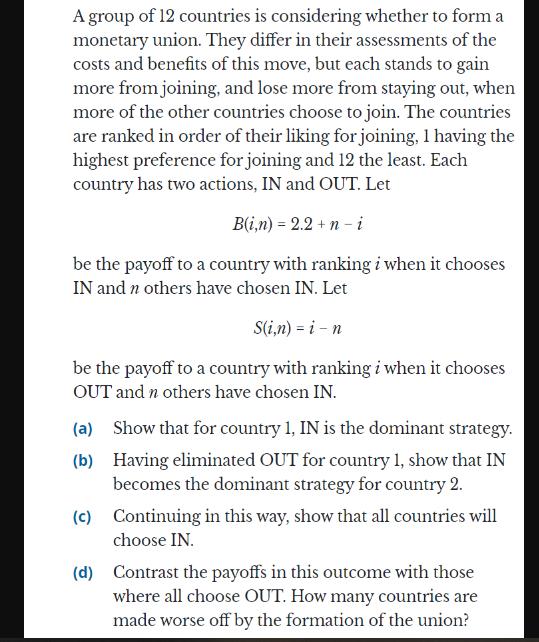Answered step by step
Verified Expert Solution
Question
1 Approved Answer
A group of 12 countries is considering whether to form a monetary union. They differ in their assessments of the costs and benefits of

A group of 12 countries is considering whether to form a monetary union. They differ in their assessments of the costs and benefits of this move, but each stands to gain more from joining, and lose more from staying out, when more of the other countries choose to join. The countries are ranked in order of their liking for joining, 1 having the highest preference for joining and 12 the least. Each country has two actions, IN and OUT. Let B(i,n) = 2.2 + n-i be the payoff to a country with ranking i when it chooses IN and n others have chosen IN. Let S(in) = i-n be the payoff to a country with ranking i when it chooses OUT and n others have chosen IN. (a) Show that for country 1, IN is the dominant strategy. (b) Having eliminated OUT for country 1, show that IN becomes the dominant strategy for country 2. (c) Continuing in this way, show that all countries will choose IN. (d) Contrast the payoffs in this outcome with those where all choose OUT. How many countries are made worse off by the formation of the union?
Step by Step Solution
There are 3 Steps involved in it
Step: 1
ANSWER a For country 1 rank 1 so i1 Now the payoff for choosing IN B1 22n1 12n where n could be 0 to 11 so worst case scenerio is n0 so minimum payoff ...
Get Instant Access to Expert-Tailored Solutions
See step-by-step solutions with expert insights and AI powered tools for academic success
Step: 2

Step: 3

Ace Your Homework with AI
Get the answers you need in no time with our AI-driven, step-by-step assistance
Get Started


